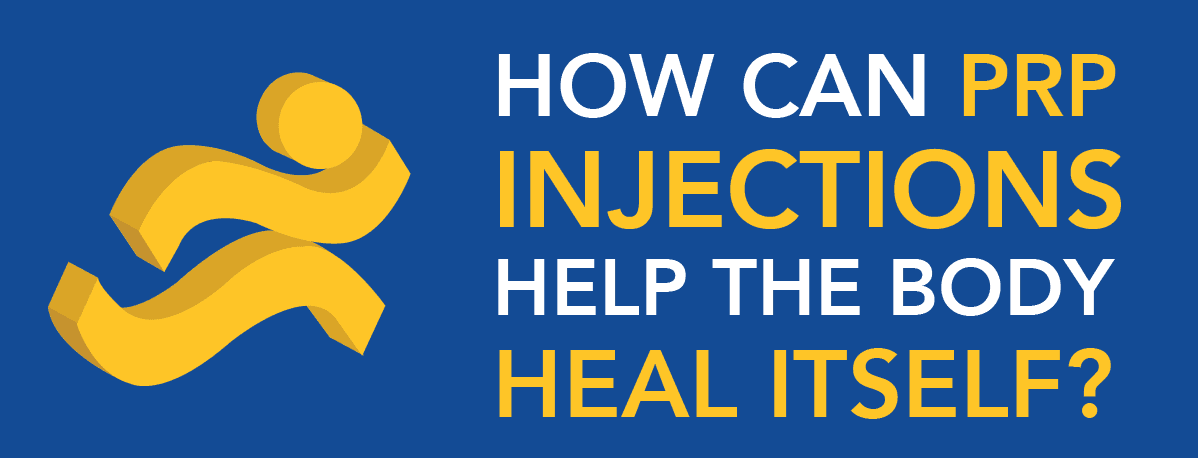What Are Platelet-Rich Plasma (PRP) Injections?
PRP injections are a treatment that separates the platelets in a patient’s own blood and uses them to promote healing. A small sample of blood is collected and placed in a centrifuge, a machine that spins at high speeds to separate the platelet-rich plasma from the other components, like red and white blood cells. Guided by ultrasound imaging to ensure accuracy and precision, the concentrated PRP is then injected directed into the affected area. The entire procedure takes about an hour.
Post-injection care may mean avoiding certain movements or activities for a period of time to optimize the healing process and minimize potential side effects. It’s normal for the injection site to become inflamed and may be quite painful for one to three days following treatment. The swelling and soreness are part of the healing process, and patients should avoid taking anti-inflammatory medication like Aspirin or ibuprofen, which can make the injection less effective.
What conditions do PRP injections treat?
PRP injections are frequently used to treat musculoskeletal injuries and orthopedic conditions like tendonitis, ligament sprains, bursitis, and partial rotator cuff tears, and tennis elbow. The injections can also be used to reduce joint pain, stiffness, and inflammation caused by arthritis.
How long will it take for me to see improvement?
Because the bioactive substances in the platelet-rich plasma need time to stimulate tissue repair and cellular regeneration, it can take a few weeks to start noticing the effects of PRP injections. Patients with musculoskeletal injuries like tendonitis or ligament sprains may experience improved functionality and pain relief quicker than patients with more severe or chronic conditions. Factors like age, overall health, and adherence to post-injection instructions all influence the speed of the healing process. It’s crucial to follow your doctor’s recommendations to maximize treatment benefits.
We recently sat down for a Q&A with our Sports Medicine provider and PRP expert, Dr. Andrew McMahon.
Q: In your own words, how does this procedure benefit your patients?
A: Platelet-rich plasma (PRP) therapy uses injections of a concentration of a patient’s own platelets to accelerate the healing of injured tendons, ligaments, muscles and joints. In this way, PRP injections use each individual patient’s own healing system to improve musculoskeletal problems.
Q: Who is a good candidate for a PRP Injection?
A:
- Patients with overall good health
- Patients with mild to moderate arthritis, partial tears, or chronic wear and tear injuries
- Patients with decreased function due to pain, stiffness, or lack of mobility
- Failure with more conservative treatment methods
It’s important to note that while PRP injections are generally considered safe, they may not be suitable for everyone. The treatment can’t be used if the tendon is torn completely and though PRP injections can address symptoms of arthritis, they can’t reverse pre-existing damage. The treatment’s efficacy and appropriateness depend on the specific condition being treated and individual patient factors. It’s important to consult with a specialist to evaluate whether PRP injections are appropriate for your specific needs.
Q: Where do you perform this procedure?
In our Portsmouth, NH office only, some of the surgeons use it intraoperatively.
Q: Do you have a recent patient success story you can share?
A: Recently, I have had a lot of success with PRP treating knee arthritis. Peter S. is a 68-year old gentleman who is very active in tennis/pickleball and is an avid skier. His moderate arthritis has given him a lot of stiffness and some pain which resulted in him cutting back on these activities at times, affecting his happiness and mental health. He had a consult for treatment options and we ultimately opted to inject PRP into both knees. Within 4 weeks, he had regained a significant amount of his function and he was able to play more tennis, and he successfully took a week long ski trip to Colorado.
Q: Anything else you’d like current or future patients to know about this procedure and how it would benefit them?
A: In the appropriate patient, PRP can offer a nice treatment option for patients with musculoskeletal problems who have failed conservative treatment options like PT, bracing, and cortisone injections. PRP can help heal soft tissue injuries (a torn tendon, for example), potentially avoiding surgical repair. PRP also provides patients with arthritis a treatment option that decreases pain and increases mobility and function. It typically lasts 2-3 times longer than cortisone injections and does not contribute to deterioration of the joint like a cortisone injection can.
Think PRP Injections may be right for you? Schedule a consultation with our specialist Dr. McMahon to learn more.



